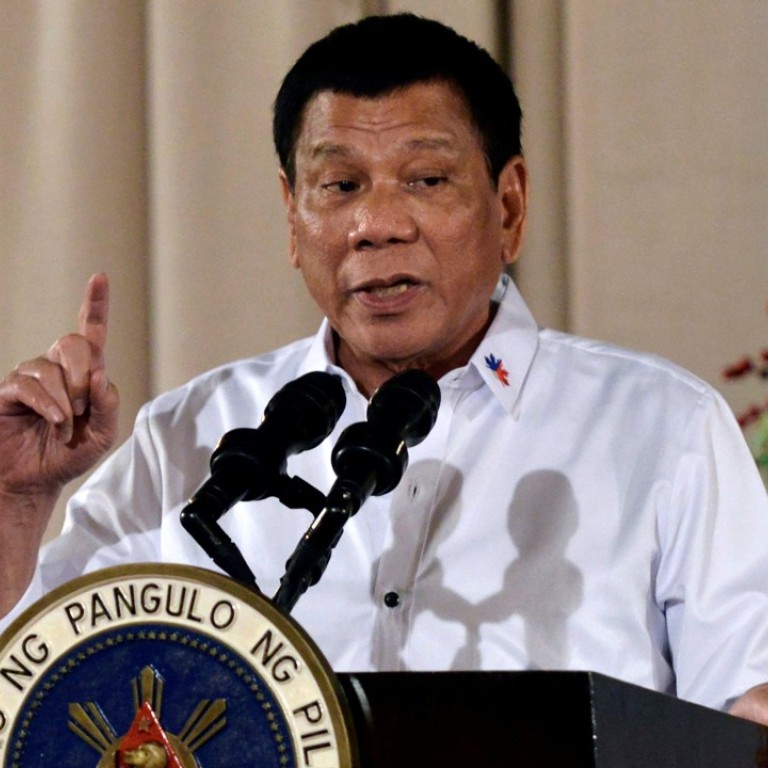
Philippine President Rodrigo Duterte asks Congress to maintain martial law until end of year
The brazen takeover of Marawi by organised, heavily armed militants who have pledged allegiance to IS has been the biggest crisis of Duterte’s one-year presidency
Philippine President Rodrigo Duterte plans to extend martial law in the southern Philippines to defeat Islamist militants who have seized a major city, his spokesman said on Tuesday, as a critic warned the country could be edging towards a dictatorship.
Duterte had imposed military rule for 60 days in the Mindanao region, home to 20 million people, after gunmen waving black Islamic State (IS) flags occupied Marawi city on May 23, triggering clashes that have killed more than 500 people.
While scores of militants continue to hold out against government forces nearly two months later, critics expressed surprise by his request for a martial law extension until December 31.
“I have come to the conclusion that the existing rebellion in Mindanao which has prompted me to issue [the martial law proclamation], will not be quelled completely by 22nd July 2017,” Duterte said in a letter to congressional leaders.
This is not only a step back, but several steps back for our democracy
Congress is to convene Saturday to discuss the request of Duterte, who met with congressional leaders late Monday, presidential spokesman Ernesto Abella told reporters.
The president also asked Congress to suspend a constitutional safeguard against warrantless arrests.
“This is not only a step back, but several steps back for our democracy,” said opposition lawmaker and prominent martial law critic Edcel Lagman, who called Duterte’s request illegal. “That would indicate the possibility of extending the coverage of martial law outside Mindanao.”
Lagman also warned of a potential repeat of the military abuses and political repression during the martial law regime of the late dictator Ferdinand Marcos, whose 20-year rule ended with a bloodless popular revolt in 1986.
The country’s constitution allows the president to impose martial law for up to 60 days, as well as allowing authorities to detain suspects for up to three days without charges to suppress invasion or rebellion.
Beyond two months, the president can extend it “for a period to be determined by the Congress”.
Duterte had sought the recommendations of the military and the police on extending martial rule but his spokesman would not say if these had called for five months of martial rule.
Duterte’s allies dominate Congress, and House Speaker Pantaleon Alvarez said on Tuesday he saw no obstacle to approving it.
In May, Duterte said he had made the move to stamp out an attempt by militants, including foreign fighters, to establish an IS caliphate on Philippine territory.
Martial law was necessary in the beginning but any extension should now be considered very carefully
“He also explained clearly his fear that terrorism might slowly spread throughout Mindanao and eventually the country,” said Senator Sherwin Gatchalian, who attended the meeting with Duterte on Monday.
However, opposition Senator Francis Pangilinan said martial rule was an “extraordinary and temporary measure” and that any extension could not be more than 60 days.
Duterte should consider limiting martial law to the Muslim regions of Mindanao, he added.
Both Pangilinan and former president Fidel Ramos, a Duterte supporter who has become critical of the administration, warned that extended martial rule may scare off investments.
“Martial law was necessary in the beginning but any extension should now be considered very carefully,” Ramos told reporters.
Security forces have been conducting a US-backed offensive to root out the gunmen, using air strikes and artillery fire, and early this week the military said about 60-80 gunmen remained over a 1 sq km area of downtown Marawi.
On Tuesday, US Ambassador to Manila Sung Kim said Tuesday his government would give its Philippine military ally two Cessna surveillance aircraft to be used in Marawi.
“We are deeply concerned about the security situation in Marawi,” Kim told ABS-CBN television.

.png?itok=arIb17P0)